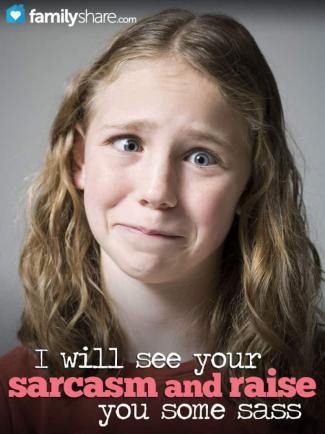
I admit it. I like sarcasm. Not the harsh, biting kind but the subtle, ironic kind that betrays wit and dry humor. I'm attracted to dry people.
I tend to speak with sarcasm, too. My intentions are usually gentle and teasing, but sometimes my words come out sharper than intended.
As I interact with my growing, gangly kids, struggling to navigate their tween and teen years, I find myself biting back many of my sarcastic observations. I enjoy their maturing and increasingly sophisticated personalities, and I struggle to balance my desire to tease with conversing sincerely and directly. I want to have fun with my kids, but I also want my words to them to be genuine and direct over ironic or mocking.
Sometimes, as parents, we tend to see our children as miniature people and forget their vulnerability and the tenderness of their ages. When my kids were small, I fear that I was a mom who sometimes forgot the sweet makeup of my kids. I was wrong to ever use sarcasm with them. Here is why:
Young kids take everything at face value
For young children, life is black or white. As they process new information, confusion clouds learning when words are delivered sarcastically.
Paul Coughlin, author of the article "Parental Sarcasm is No Joke,"� shares his insights on the effects of sarcasm. "As I studied sarcasm throughout the Bible, I found that God, his son and the prophets didn't use it against the weak, timid or humble. They never unleashed it upon a child. Rather, it was used against people who were stubborn, self-righteous or arrogant."�
You lose your child's trust
"Can it really rain cats and dogs?"� your young one asks.
"Sure, honey, it can really rain cats and dogs,"� you answer sarcastically.
Even after you've clarified that cats and dogs don't really fall from the sky, your child is left wondering why you tried to mislead him. His faith in you is diminished, especially if you use sarcasm often. Not even a "just kidding!"� can repair the assurance and confidence he once had that everything you told him was truthful and accurate.
Sarcasm belittles and bullies
By definition, sarcasm "conveys insults or scorn,"� according to thefreedictionary.com. Young children need our encouragement - never belittlement. Our cheers and praise build little ones' sense of security and self-esteem.
Our kids readily absorb everything we teach and tell them. As we converse with our children, why would we ever deliberately insult them?
Coughlin explains, "Parental sarcasm ... is often a hiding place for undisclosed anger, annoyance even jealousy. It provides parents the dishonest opportunity to wound without looking like they're wounding; they can later fall back on the age-old cop-out, 'I didn't mean it. Can't you take a joke?' Sarcasm favors parents, who are much more proficient at using it than children. Because of this unequal power, parental sarcasm can be a form of bullying."�
Bantering with our kids and enjoying their growing, maturing personalities can be fun, but we should always be careful. "I'm not advocating a home without humor, but parents need to use the right kind of humor and the right kind of sarcasm - the exposure of irony or wrongdoing without contempt or belittlement,"� says Coughlin.
I've learned it's better to play it safe and reserve dry, ironic humor for the adults in my life.

